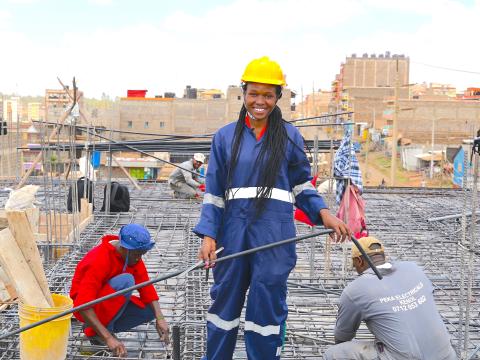Empowering women to combat HIV and promote gender equality

By Hellen Githakwa, Communications Specialist, World Vision Kenya
The construction industry in Kenya is largely a male dominated sector, with limited opportunities for women.
With a value of over four billion dollars and an annual growth rate of seven percent, women comprise only three percent of the industry's workforce.
Despite this challenge, Jane – a young women in her twenties - has defied all odds and shattered barriers by not only gaining employment in the industry but also becoming an avid HIV prevention advocate.
Her remarkable journey from despair to empowerment, exemplifies the transformative power of the DREAMS Programme, which is being implemented by World Vision’s USAID Tumikia Mtoto project in Kenya.
In a region where women make up only three percent of the construction workforce, Jane's story stands as a beacon of hope and resilience.
Hailing from a low-income family in Kyanni, Kenya, Jane faced limited educational opportunities and later opted to became a volunteer teacher after completing her high school studies.
However, an ill-fated relationship left her as a single mother, struggling to make ends meet for herself and new-born child. The COVID-19 pandemic further exacerbated her challenges.
Determined to seek better opportunities for herself and her child, Jane made the brave decision to relocate to Nairobi in 2021.
Fate led her to secure employment as a cleaner in an office near a DREAMS Safe Space run by World Vision’s USAID Tumikia Mtoto project in Kamenu, Kiambu County, Kenya.
This proximity introduced her to the life-changing DREAMS programme, which seeks to reduce the risk of HIV infection and gender-based violence while empowering adolescent girls and young women (AGYW) economically.
Eager to seize the opportunity, Jane wholeheartedly embraced the programme, immersing herself in a range of training sessions offered. They include Social Asset Building, Financial Capability, Entrepreneurship, Reproductive Health and HIV Prevention .
Jane found solace and encouragement in the training sessions focusing on Social Asset Building, where she connected with other girls facing similar challenges.
"I met other girls like me. It was so encouraging to hear them talk about their experiences. This made me realise that we all have stories to tell and challenges that we have passed through,” she says.
Through the Financial Capability training sessions, Jane learnt about the importance of budgeting and saving. This enabled her to save a substantial portion of her income.
"I started to save for the first time in my life. From my KSh.11,000 monthly salary that I used to earn as a cleaner, I would now save KSh. 5,000. This is almost half the amount I was earning at the time,” notes Jane.
She adds, “The class transformed my thinking about finances and made me realise that it is more about how you manage your finances and not necessarily how much you make."
The turning point came when Jane became one of the first 100 girls to be enrolled in the DREAMS Construction Skills Training programme, which was implemented through a collaboration between the Family Group Foundation and World Vision’s USAID Tumikia Mtoto.
Jane received comprehensive training as an electrician, coupled with three months of on-the-job training at Kenyatta University.
Armed with her newly acquired skills, Jane defied stereotypes and secured a job on a construction site at Weteithie, in Kiambu County, Kenya.
Working alongside her male colleagues and another DREAMS programme graduate, Jane's exceptional expertise and the support of her team propelled her to success. Her dedication and reputation as a skilled electrician have earned her the respect and recognition she deserves.
Not content with merely achieving personal success, Jane has also taken it upon herself to give back to her community.
She actively mentors young adolescents and encourages them to develop skills that will enhance their livelihoods and protect them from HIV infection.
"In a desperate attempt to make ends meet, sometimes young women engage in risky behaviours that increase their chances of getting HIV, such as commercial sex work . They may also choose to remain in abusive relationships that increase their risk of infection, especially if their partners are unfaithful to them. This is why it is important for women to be economically empowered," says Jane.
By challenging gender norms and advocating for equality, Jane has become a trailblazer and a source of inspiration for young women in her community.
"I would like to challenge my fellow girls to do the work they get without claiming that it is manly. I am happy to work as an electrician," says Jane with a cheerful smile.
Through the power of social media platforms such as Facebook, WhatsApp and TikTok, Jane has harnessed technology to establish a sustainable source of income.
By leveraging these platforms, she advertises her services, attracts clients and expands her network. This has solidified her position as a self-sufficient entrepreneur.
Jane attributes her transformation to the World Vision’s USAID Tumikia Mtoto project and the Family Group Foundation, that have economically empowered her and given her a newfound sense of purpose.
She is grateful for the opportunities they have provided, which have allowed her to overcome adversity and prosper.
Since 2022, the programme has trained and equipped over 250 young women in plumbing, electrical work and painting skills.
The training is aimed at enhancing the employability of vulnerable young women, as well as improving their livelihoods and household income. This is aimed at reducing their risk of HIV infection .